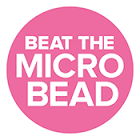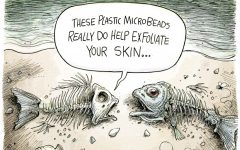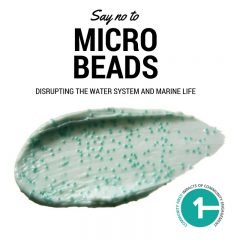by Carly Foubert, CFICE Communications RA
Microbeads are a common ingredient in cleansers for exfoliating and scrubbing skin. Although they can freshen and brighten your face, there are countless arguments that can be made against the harmful environmental effect that microplastics have. While a few countries are initiating bans on microbeads and some are encouraging shoppers to restrain from purchasing products with plastic in it, you can do your part by being more conscientious of the products you buy.
 Microbeads damage the water supply and the marine life. Beat the Microbead, an international campaign to ban the use of microbeads, reports that marine life is often unable to distinguish between the plastic beads and food. Over 663 different species were negatively affected by marine debris, with approximately 11% of cases regarding the ingestion of microbeads.
Microbeads damage the water supply and the marine life. Beat the Microbead, an international campaign to ban the use of microbeads, reports that marine life is often unable to distinguish between the plastic beads and food. Over 663 different species were negatively affected by marine debris, with approximately 11% of cases regarding the ingestion of microbeads.
Even more concerning, microbeads can act as tiny sponges absorbing harmful chemicals and pesticides, which are then ingested by marine life when they unknowingly consume plastic microbeads. Microbeads can also enter the human food chain.

©The Buffalo News
The concentration of microbeads makes it more difficult for citizens to ignore plastic pollution. It is particularly prominent in Lake Erie which acts as a bottleneck pouring into the St. Lawrence River the runoff from sewage treatment plants along the Great Lakes. In Lake Erie there is a microbead concentration of 450 000 per square kilometres.
 Please be conscientious of what is in your cleansers and beauty products and the effect it has on the environment. Make an effort to choose more environmentally sustainable products or try some homemade cleansers. Many ingredients in your kitchen can be used to make scrubs and facial washes. Instead of microbeads, sugar is an excellent exfoliant that can be mixed with coconut oil and essential oil to create a sugar scrub.
Please be conscientious of what is in your cleansers and beauty products and the effect it has on the environment. Make an effort to choose more environmentally sustainable products or try some homemade cleansers. Many ingredients in your kitchen can be used to make scrubs and facial washes. Instead of microbeads, sugar is an excellent exfoliant that can be mixed with coconut oil and essential oil to create a sugar scrub.